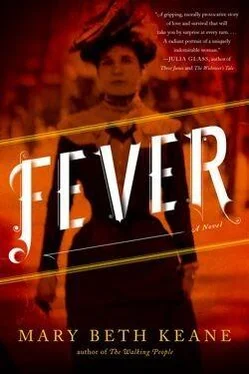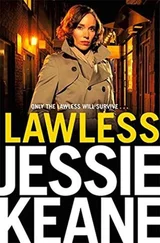“Coffee?” he asked without looking at her. He turned over the mug on the counter and found another from within a cupboard that held only a few mismatched plates.
“You all right, Alfred?” she asked. Maybe an accident like the one he’d had changes a person. Maybe she’d been too cruel, leaving him in the vestibule that time. Maybe he’d waited for her and waited for her, and when she didn’t come back, and didn’t search for him, he’d had to shake himself loose of her for good. Maybe he’d made his own vows to himself, and her showing up now had knocked him off balance. She cast her eye quickly around the kitchen and noted a single bottle of Powers Gold on the top shelf of the cabinet, two-thirds full. She noted an empty bottle of Baby Powers next to the sink. Maybe this was a new kind of discipline. She smelled the air again, and again came up with nothing. Maybe, like a doctor, he’d learned his dosage, finally, and had become strict in measuring it out.
He saw where she was looking and picked up the small bottle, dropped it in the trash can.
“I didn’t say anything,” Mary said. He leaned against the counter. Folded his arms.
“What is it, Mary? Has something happened?”
“I’m hungry, Alfred. Will we eat? Will I make you something?”
“I’ll make it.”
Slowly, and watching him carefully all the while, she explained everything to him over a supper of fried eggs and toast, cooked by him and served to her on a dish so clean she wondered if Jimmy had warned him, somehow, that she was headed uptown to find him. He smirked for the first time when she pointed out that baking and cooking were two entirely different occupations, and looked at her over his shoulder as if to ask if she believed that, or if she hoped he would believe it, before turning back to the stove to flip the eggs, first one, then the other, and she paused her story to lift her chin and peer into the pan to see if he’d broken the yolks. When she saw the eggs had remained intact, she continued, telling him about the bakery, about Evelyn and Jacob, about throwing the plate of lemon squares when she saw Soper’s face. She lifted her chin again and told him the eggs were ready, so he slid them onto two plates, put the toast alongside, and when she pushed into the soft center with the hard corner of bread it ran in a beautiful, pure, yellow river across her plate, exactly as it should. She told him about the Triangle fire, about how strange it was that she could remember every single detail of that day better than even the first day she left North Brother for the hearing, better than the day they set her free. She could remember what she was wearing down to the undergarment, the man with the ink-stained shirt, the shirt itself, pale pinstriped blue. She remembered the Lithuanians looking up at the rumbling ceiling with fear on their faces, and then the pandemonium outside, followed by the eerie calm of the days after.
“And you?” Mary asked. “The nun said you were released in November.”
“I was,” he said, running the tip of his finger across the plate and bringing it to his mouth. “I went to Minnesota for a while, but—”
“But?” Here it was. He appeared healthy, strong, sure-footed, and of steady hands, but here it was. Drinking on the job. Chronic lateness. What would it be?
“It wasn’t for me.”
He pushed back his plate. He got up to make more coffee. “What about you? Do you mean to stay here?” She felt him looking at her bag. She’d known him since she was seventeen. A lifetime ago, and still, she was nervous.
“Yes,” Mary said. She turned in her seat to look at him. He was still for a moment, then he grabbed hold of the back of the chair where she was sitting.
“Good,” he said. “That’s very good.”
• • •
That night, as she went to the small bedroom to change into her nightgown, he came in and sat on the edge of the bed. She’d gotten heavier since he’d seen her last. He’d gotten thinner. Her arms were soft. Her belly was soft. She’d never have children now, and that was a thing that took getting used to. Women said it so easily. When I get married. When I have a child. And then to find herself a forty-three-year-old woman who would not have a child, to know that that future had arrived already, was already part of her past.
When she had her clothes folded and stacked on top of the dresser, her cream and hairbrush placed alongside, he told her he was going out for milk and bread, and she felt for the first time that day that she’d made a mistake. He was on the wagon from the looks of it, but now here he was, not even a whole day with her and he was making excuses to go out. She had a vision of herself meeting the neighbors when he came home at two in the morning, howling. So she said nothing, only lay down on her side of the bed and closed her eyes. She was startled into sitting when, not fifteen minutes later, the locks slid in the door and he was back.
“You scared me,” she said when he appeared at the bedroom door. He sat in the desk chair and brought to Mary’s mind the image of a priest listening to confession, all those years ago, all the way across the Atlantic.
“How are we going to do this, Mary?”
“I don’t know,” she said.
He reached into the desk drawer and brought out a bottle of oil. He twisted off the cap, shook some into his palm, and rubbed it up and down his bad arm, briskly, like he was trying to rub that thick skin into what it used to be. When he returned the oil to the drawer, Mary noticed other small vials, a syringe, pills scattered like seed on a lawn. She got out of bed to look closer.
Alfred took out everything to show her. “For the pain.”
“It still hurts?” Mary was surprised. The arm looked damaged, but closed over, like it had healed itself completely and had shut itself off from pain.
“Sometimes. They say I need it for maintenance.”
“Is that unusual? So long after?” Mary noticed that his good arm was covered in gooseflesh.
Alfred shrugged. “The doctor keeps giving me the prescription.” He put the vial back in the drawer and closed it. “Sometimes it’s hard to sleep, so it’s for that, too. It’s been hard to sleep since getting back to New York.” Mary knelt down beside him and took a closer look. It was like a tree trunk, thick with bark and impenetrable. Next to it, the pale white of his good arm looked vulnerable, like it would be easily broken, quick to burn.
“Is it just your arm?” she asked, and quietly, his movements sure, he opened his shirt, pulled open the right side where the fire had taken a swipe at his chest, from his collarbone to the bottom of his rib cage. It wasn’t quite as bad as his arm, but it was there. She put her palm to it and felt his heart beating underneath.
“I started letters to you but I didn’t know what to say. I was trying to think of the perfect thing so that you’d agree to see me again. And then you showed up. You just showed up.”
Before he kissed her, he gripped her at the upper arms and put his forehead to hers. She closed her eyes, and the rough stubble of his chin and cheeks brushed up against the smooth skin of her neck as he breathed there for a moment, rested his head on her shoulder. She was tired, all of a sudden, and looking back over the twenty-six years since they met it seemed as if they never stopped, only worked and fought and went up and down stairs and opened and closed windows and counted their money at the table and fought again, and went out again, and once in a while they looked at each other, and talked, and laughed, and made love without rushing up to get somewhere after. Outside, a child shrieked, a woman shouted at him to hush. Alfred’s room had grown dark, and what had seemed stark and bare to her before now seemed merely simple, spare. Notes of Alfred played around the room, his razor on the edge of the sink, his boots topsy-turvy by the door.
Читать дальше












